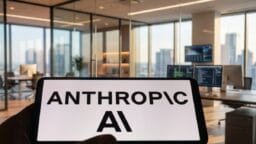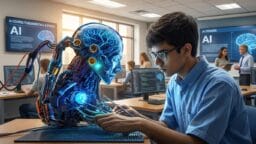Goldman Sachs CEO Advocates for AI Amidst Workforce Concerns
In the ongoing discourse surrounding the ramifications of artificial intelligence on the labor market, David Solomon, CEO of Goldman Sachs, emerges as a proponent of cautious optimism.
Amidst a backdrop of significant layoffs at leading tech firms such as Meta and Amazon, Solomon asserts that AI is unlikely to trigger extensive job loss; instead, he envisions a phase of evolution and fresh prospects.
This outlook is particularly pertinent as apprehensions over an impending ‘AI-induced job apocalypse’ proliferate, underscored by recent analyses.
Solomon elaborated on his perspective during a recent interview, drawing parallels between the emergence of AI and previous technological revolutions, while noting the unprecedented velocity of this particular shift.
“The ascent of AI resembles former tech revolutions, albeit at an accelerated pace,” he expressed to Business Insider. He maintains that despite transformations in job roles, the overarching impact could be advantageous, possibly leading to an expansion in workforce size at firms like Goldman Sachs over the next decade.
This viewpoint starkly contrasts the prevailing narrative surrounding widespread terminations. Companies including Meta, Amazon, Salesforce, and YouTube have pointed to the efficiencies introduced by AI as justifications for their workforce reductions, exacerbating fears about the fate of white-collar positions.
A CNN Business article highlights AI’s pervasive influence in these cuts, raising alarms about a prospective employment collapse.
The Accelerated Transformation of AI
Solomon acknowledges the rapid adoption of AI technology, distinguishing it from historical transitions such as the industrial revolution or the advent of the internet.
In conversations with fellow CEOs, he notes a widespread focus on AI-enabled automation, yet he expresses enthusiasm about the adaptive strategies that human workers will implement.
“Indeed, job functions will evolve…But I find this exhilarating,” Solomon stated in an interview with Fortune.
At Goldman Sachs, Solomon posits that AI could foster an increase in headcount. “Many anticipate that Wall Street may shed jobs due to artificial intelligence. David Solomon, however, envisions otherwise,” reports Business Insider.
He foresees AI augmenting productivity, enabling more intricate tasks that may necessitate a greater number of ‘high-value professionals’ in specialized capacities.
This optimistic outlook is balanced by a prudent assessment of realities. Solomon acknowledges the emergence of ‘winners and losers’ within the AI ecosystem, suggesting that while opportunities are vast, the outcomes of various investments will not uniformly flourish.
“There will be winners and losers,” he conveyed to Fortune, emphasizing AI as a potent catalyst for U.S. economic advancement while advising that the trajectory is unlikely to be straightforward.
Refuting the Layoff Narrative
Recent waves of technology-related layoffs have heightened fears regarding job stability. Amazon has outlined plans to eliminate as many as 30,000 white-collar roles, with the potential for automation to replace another 500,000 positions in the next five years, according to updates shared on X and reports from WebProNews.
Likewise, Meta’s consolidation of AI initiatives has culminated in over 600 layoffs, as noted in various industry analyses and social media debates.
In response to this climate of anxiety, Solomon challenges the prevailing ‘freakout’, asserting that AI will stimulate a demand for skilled professionals rather than obliterate existing roles.
During an interview with Bloomberg, he discussed the burgeoning AI opportunities in regions like Saudi Arabia and across the U.S. economy, underscoring productivity enhancements.
“AI propels productivity and restructures roles for skilled labor,” he elucidated, according to WebProNews.
Goldman Sachs’ strategy takes a comprehensive ‘front-to-back view’ on organizing personnel in relation to AI, prioritizing efficiency without resorting to mass layoffs.
Surveys from Goldman analysts anticipate a modest 4% contraction in headcount industry-wide within the forthcoming year, escalating to 11% over three years; however, Solomon perceives this as a facet of a broader adaptation rather than annihilation.
Economic Implications Beyond Employment
Beyond the realm of employment, Solomon connects AI to larger economic challenges, such as the daunting $38 trillion national debt faced by the U.S. He proposes that AI-driven growth could represent a ‘pathway out’ by enhancing GDP.
“The way forward is one of growth. The disparity between compounded growth at 3% versus 2% is colossal,” he remarked to Fortune.
This perspective resonates with sentiments voiced by other industry leaders, including JPMorgan’s Jamie Dimon, as reported in The Times of India. Solomon believes that AI can enhance productivity to effectively tackle fiscal challenges, defusing concerns surrounding debt-to-GDP ratios.
Nonetheless, he does not overlook potential hazards. In a recent CNBC article, Solomon cautioned about a prospective downturn in the stock market, indicating that investors may be neglecting the inherent risks associated with AI.
“There will be substantial capital deployed that fails to generate returns,” he stated in Fortune, likening it to historical market manias.
Industry Sentiment and Future Outlook
Social media platforms like X portray varied sentiments, featuring posts that underscore AI-induced layoffs in organizations such as Oracle and Dropbox, while others resonate with Solomon’s advocacy for retraining initiatives.
One post noted, “Amazon’s 30K layoffs & 500K job reductions over five years extend beyond mere efficiency,” highlighting the existing divides within the skills and employment landscape.
Solomon champions investment in AI education as a means to seize future opportunities. At gatherings like Saudi Arabia’s Future Investment Initiative, he articulated the role of AI in shaping economic paradigms, as reported by Bloomberg. He believes that AI will spur demand for ‘high-value individuals,’ as outlined in Tekedia.
Wall Street’s adaptation to AI necessitates a reassessment of talent. Solomon’s Goldman Sachs is strategically positioning itself to harness AI for growth, potentially increasing employment in areas such as data analysis and algorithmic trading, while automating more repetitive tasks.
Navigating Winners and Losers
The surge in AI has fueled bubble anxieties, with Solomon acknowledging that it may echo previous bubbles, though he insists, “it’s not distinct” from historical trends.
Posts by Financial Times on X revealed his caution that a portion of AI investment may “ultimately fail to yield returns.”

Despite such reservations, Solomon maintains a bullish stance on the transformative capabilities of AI. Reports from Axios shared on X portray his conviction that AI will enhance performance benchmarks and promote growth on Wall Street, rather than merely facilitating job cuts.
As industries navigate the complexities of AI integration, Solomon’s insights provide a strategic roadmap: embrace transformative change, invest in skill enhancement, and concentrate on elevating productivity.
Such an approach could redefine the nature of work, converting anticipated losses into significant gains for those adept at adapting.
Source link: Webpronews.com.





